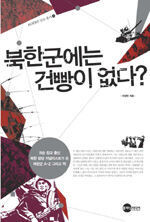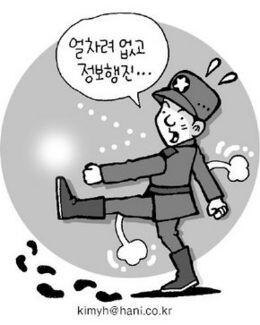hankyoreh
Links to other country sites 다른 나라 사이트 링크
Book sheds light on life in N.K. army
Defector says S.K. perception mired in stereotype

Contrary to rumors of brutality among the ranks, according to a book by a North Korean defector, there is no corporal punishment and detention within the North Korean Army.
Instead, ranked officers draw a square on the practice grounds and have the rule-breakers do a "formal march" (the North Korean parade walk) along the outline of the square. The military detention system was also abolished in the 1960s. In other cases, a soldier who disobeys the orders of his/her squad leader will be pressed to assume responsibility for their action, and then faces a ‘mutual verbal critique’ during the daily assembly.
The book, Would North Korean Soldiers Have Hardtacks? by Lee Jeong-yeon, a 38-year old ex-DPRK soldier, was written to give "a more accurate and objective information on the DPRK armed forces to the South Koreans," Lee said. The work highlights many of the details of North Korean military life.

For example, you are expected to call your fellow soldier ‘comrade’ rather than by name, which could seem to signify mutual respect, somewhat in contrast to South Korean culture, where soldiers address each other based on rank and on the fact that addressing others by name is considered rude in Korean culture. Vacations and visitation are very rare commodities. You get a 10-day vacation if your parents pass away, but whether you can actually take the leave depends on timing and luck. The rule says you can have visitors in the barracks, but the reality is that no parents or girlfriends can visit. Thus, most DPRK soldiers do not get to see their families, friends, or loved ones during their 10-year compulsory service, the book said.
Until he defected from the North Korea in 1999, Lee served in different organizations in the DPRK armed forces, including as a border watchman, in the reconnaissance battalion, in another reconnaissance division of the People’s Army, and as a member of a secret police organization directly under the leader’s control. Lee says in his book that upon arrival in the South, "It was shocking to see the South Koreans interpreting the DPRK armed forces as they see fit, based on old information and stereotypes." He now works for the Japanese media as a reporter on North Korean issues. His new book is a compilation of his Internet articles on his life in the DPRK armed forces.
Although there is no official disciplinary action, Lee said, soldiers do sometimes resort to extreme measures in settling problems with one another. In 1991, a soldier killed 10 others with a hand grenade in a barracks near the Military Demarcation Line. The third-year soldier threw the grenade into his barracks in revenge for maltreatment by his seniors. Seven out of the 16 sleeping soldiers died on site and three died on the way to the hospital. All of the survivors were dishonorably discharged and many of the commanding officers were reprimanded. The soldier that threw the hand grenade was executed by firing squad.
The book also introduces jargon used by DPRK soldiers to make fun of those "cunning" people from Pyeongyang, "slow" people from Hwanghae Province, and "ferocious" Hamheung residents. The book also tells of soldiers’ life-and-death endeavors to obtain wild ginseng or bear’s gall bladder to present as holiday gifts to their superiors.
The book says that military service is recognized as a necessity for one to succeed in North Korean society.
Please direct questions or comments to [englishhani@hani.co.kr]
Editorial・opinion
![[Column] Has Korea, too, crossed the Rubicon on China? [Column] Has Korea, too, crossed the Rubicon on China?](https://flexible.img.hani.co.kr/flexible/normal/500/300/imgdb/original/2024/0419/9317135153409185.jpg) [Column] Has Korea, too, crossed the Rubicon on China?
[Column] Has Korea, too, crossed the Rubicon on China?![[Correspondent’s column] In Japan’s alliance with US, echoes of its past alliances with UK [Correspondent’s column] In Japan’s alliance with US, echoes of its past alliances with UK](https://flexible.img.hani.co.kr/flexible/normal/500/300/imgdb/original/2024/0419/2317135166563519.jpg) [Correspondent’s column] In Japan’s alliance with US, echoes of its past alliances with UK
[Correspondent’s column] In Japan’s alliance with US, echoes of its past alliances with UK- [Editorial] Does Yoon think the Korean public is wrong?
- [Editorial] As it bolsters its alliance with US, Japan must be accountable for past
- [Guest essay] Amending the Constitution is Yoon’s key to leaving office in public’s good graces
- [Editorial] 10 years on, lessons of Sewol tragedy must never be forgotten
- [Column] A death blow to Korea’s prosecutor politics
- [Correspondent’s column] The US and the end of Japanese pacifism
- [Guest essay] How Korea turned its trainee doctors into monsters
- [Guest essay] As someone who helped forge Seoul-Moscow ties, their status today troubles me
Most viewed articles
- 1[Column] The clock is ticking for Korea’s first lady
- 2Hong Se-hwa, voice for tolerance whose memoir of exile touched a chord, dies at 76
- 3After 2 months of delayed, denied medical care, Koreans worry worst may be yet to come
- 4[Column] Has Korea, too, crossed the Rubicon on China?
- 5US overtakes China as Korea’s top export market, prompting trade sanction jitters
- 6[Correspondent’s column] In Japan’s alliance with US, echoes of its past alliances with UK
- 7All eyes on Xiaomi after it pulls off EV that Apple couldn’t
- 8Samsung barricades office as unionized workers strike for better conditions
- 9[Photo] Smile ambassador, you’re on camera
- 10[Correspondent’s column] The US and the end of Japanese pacifism